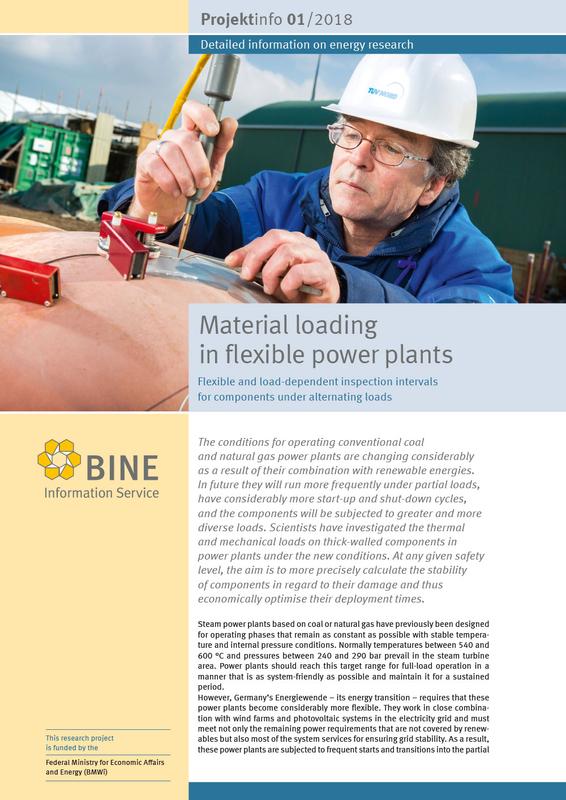Checking power plant components in a more targeted manner

The BINE-Projektinfo brochure entitled "Material loading in flexible power plants" © BINE Informationsdienst
This enables operators and monitoring institutions to calculate the stability of components in terms of their damage more accurately and without compromising on safety.
Adjusting inspections to the actual load
Until now, conventional power plants were designed for full-load operation with constant pressure and temperature conditions. However, if in future it is intended that they should only produce the electricity requirement not covered by renewables, this will require a new, flexible mode of operation.
For all components, this means more part loads, more start-up and shut-down cycles, and more extreme and rapid temperature changes. Scientists have therefore studied the loads on thick-walled power plant components under cyclic temperature changes.
They have developed and tested a new method for conducting fracture mechanics-based analyses of the damage tolerance. The findings were also incorporated into a draft guideline for the fracture mechanics-based concept, which is currently in the validation phase.
The results are important for the business calculations made by power plant operators because the more frequent partial load operation causes not only higher maintenance costs but also reduced revenue from electricity sales than under full-load operation. TÜV Nord carried out the research project together with the University of Rostock and Research Centre Jülich.
You found all informations about the BINE Projectinfo brochure entitled “Material loading in flexible power plants” here:
http://www.bine.info/en/press/press-releases/press/pressemitteilung/kraftwerksko…
Uwe Milles/Birgit Schneider
presse(at)bine.info
About BINE Information Service
Energy research for practical applications
The BINE Information Service reports on energy research topics, such as new materials, systems and components, as well as innovative concepts and methods. The knowledge gained is incorporated into the implementation of new technologies in practice, because first-rate information provides a basis for pioneering decisions, whether in the planning of energy-optimised buildings, increasing the efficiency of industrial processes, or integrating renewable energy sources into existing systems.
About FIZ Karlsruhe
FIZ Karlsruhe – Leibniz Institute for Information Infrastructure is a not-for-profit organization with the public mission to make sci-tech information from all over the world publicly available and to provide related services in order to support the national and international transfer of knowledge and the promotion of innovation.
Our business areas:
• STN International – the world’s leading online service for research and patent information in science and technology
• KnowEsis – innovative eScience solutions to support the process of research in all its stages, and throughout all scientific disciplines
• Databases and Information Services – Databases and science portals in mathematics, computer science, crystallography, chemistry, and energy technology
FIZ Karlsruhe is a member of the Leibniz Association (WGL) which consists of 87 German research and infrastructure institutions.Weitere Informationen:
http://www.bine.info/en – BINE Informationsdienst
Media Contact
All latest news from the category: Power and Electrical Engineering
This topic covers issues related to energy generation, conversion, transportation and consumption and how the industry is addressing the challenge of energy efficiency in general.
innovations-report provides in-depth and informative reports and articles on subjects ranging from wind energy, fuel cell technology, solar energy, geothermal energy, petroleum, gas, nuclear engineering, alternative energy and energy efficiency to fusion, hydrogen and superconductor technologies.
Newest articles

A ‘language’ for ML models to predict nanopore properties
A large number of 2D materials like graphene can have nanopores – small holes formed by missing atoms through which foreign substances can pass. The properties of these nanopores dictate many…

Clinically validated, wearable ultrasound patch
… for continuous blood pressure monitoring. A team of researchers at the University of California San Diego has developed a new and improved wearable ultrasound patch for continuous and noninvasive…

A new puzzle piece for string theory research
Dr. Ksenia Fedosova from the Cluster of Excellence Mathematics Münster, along with an international research team, has proven a conjecture in string theory that physicists had proposed regarding certain equations….



